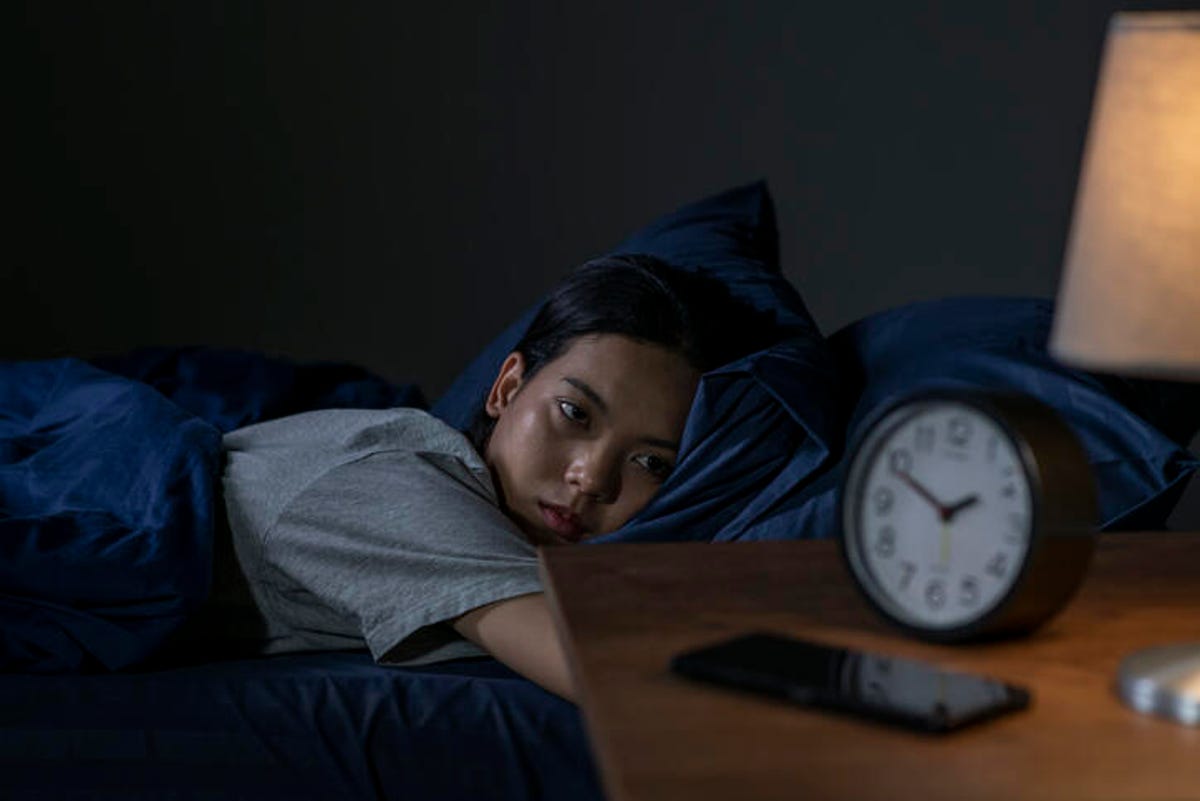Depression often manifests as sleep troubles, though the relationship between sleep and depression doesn't look the same for everyone. For some individuals, all they want to do is sleep, while others find that their depression sparks insomnia that they can't seem to shake.
It can be difficult to get restful sleep while living with depression, but it's crucial you do so. Not sleeping enough can exacerbate depressive symptoms, making it difficult to cope with daily life. Prioritizing your sleep quality is one way to take proactive steps to mitigate the effects of your condition. Use these six simple strategies to sleep well even when depressive symptoms spike.
For more daily tips, see seven ways to beat burnout, which foods you should eat for a happiness boost and four things you can do right now to improve your mental health for free.
What is depression?
To understand how sleep and depression are related, we need to establish what depression is. Depression, also called major depressive disorder, is a common mood condition affecting how someone feels, thinks and behaves. It's not just feeling sad; depression is marked by persistent negative feelings and losing interest in activities you enjoy. It's one of the most common mental disorders, and according to the National Institute of Mental Health, approximately 21 million US adults had at least one major depressive episode in 2021.
Common signs of depression include but are not limited to:
- Depressed mood
- Diminished interest in activities
- Fatigue or feeling like they have no energy
- Feelings of worthlessness
- Inability to concentrate
- Altered sleep patterns
The Diagnostic and Statistical Manual of Mental Disorders (DSM-5) is what mental health professionals use to diagnose conditions. Of the list the DSM includes, a person must have at least five of the symptoms during the same two-week period to be diagnosed with depression.
Recent research investigating positive coping strategies and mental health outcomes found that quality sleep helps combat depressive symptoms. That's right: Being intentional about your rest can help you improve your mental state. Let's dig a little further.
What's the connection between sleep and depression?
Sleep and depression have a bi-directional connection, meaning they feed on each other. Depression can cause sleep troubles, and not sleeping well can contribute to heightened depression symptoms. One of the first signs of depression is sleep disruption.
Depression can make it hard to sleep
When someone is dealing with depression, their sleep patterns are altered. One study found that 90% of people with major depressive disorder also develop a sleep disorder.
Sleep disruptions due to depression can present in two main ways: hypersomnia or insomnia. Hypersomnia is difficulty staying awake during the day because you feel tired, even if you slept at night. Insomnia is having a hard time falling asleep and staying asleep. With both types of sleep disturbances, any sleep you manage to get with depression isn't the best quality. You get less restorative sleep while depressed.
We need sleep to regulate our moods
While we sleep, the amygdala (our brain's emotional processing center) regulates and reviews the day's events. When you're sleep-deprived, the amygdala is overactive and triggers negative emotional responses to stimuli. You're reactive to things that normally would roll off your back, which can cause your mood to plummet, making it harder to cope with daily stress.

Depression can affect our sleep quality and patterns.
Filmstax/Getty ImagesQuality sleep can help combat depression
Depression is a serious mood disorder that can severely affect someone's ability to function in everyday life. The good news is that it's not something you need to struggle through alone; help is available. The gold-standard treatment for depression is cognitive behavioral therapy, but medications are also often prescribed in addition to therapy.
That said, you can't just treat your depression and expect sleep to follow.
"It's important to find ways to improve disrupted sleep to help recover from depression and improve mood, concentration, memory, irritability and other uncomfortable experiences related to depression," said Jill Harkavy-Friedman, who holds a PhD in Clinical Psychology. Harkavy-Friedman is the senior vice president of research at the American Foundation for Suicide Prevention.
If you don't address sleep issues, the treatment for depression is less impactful as you're not giving your body the tools it needs to function properly. Additionally, depressive episodes are more likely to return if you don't make meaningful changes in your sleep habits. You have to address both sides.
6 tips for sleeping better with depression
It can be challenging to break the cycle of poor sleep and depression. Improving your sleep won't just benefit your mental health; it also ensures your physical health is on track. Remember, with all of these tips, consistency is critical.
1. Establish a bedtime routine
Before you do anything, take a second to look at your behaviors surrounding sleep. Establishing a bedtime routine can help build a structure your body will get used to.
"Have a set time for preparing for bed where you focus on basic hygiene (face, teeth, body, etc.), separating from screens, and creating a sleep environment by turning down the lights and temperature," Harkavy-Friedman said. Doing the same thing each night will help your body relax enough to fall asleep.
You should also avoid overstimulation for at least a few hours before climbing into bed. "Try engaging in activities that make you feel relaxed, such as focusing on breathing, relaxation apps, quiet music or a book that isn't too mentally stimulating," Harkavy-Friedman added.
2. Spend time outside
Think of spending time outside as a two-for-one special. Not only does it boost your mental health, but it also can help you sleep at night.
One suspected contributing factor to depression is low serotonin levels, the neurotransmitter that regulates mood. It's often referred to as the "feel-good" chemical. Going outside is one way to naturally boost serotonin levels in your brain. Studies have found that sunlight can increase the body's serotonin production.
Going outside will also help improve your sleep by "resetting" your internal clock, which promotes normal sleep patterns. Melatonin is the hormone that helps regulate our circadian rhythm, known as the sleep-wake cycle. Our brains produce melatonin in response to darkness to facilitate sleep. It's all too easy to throw off this natural process. Going outside and reminding your body when it's light out can help restore balance.
3. Use naps strategically
If your depression sleep disturbances present as hypersomnia, it's easy to fall into a pattern of frequent, long naps. While naps aren't bad, you should assess why you're napping. Is it a way to cope or escape symptoms? Or do you just need a chance to step away and relax for a bit?
If you feel like you need a nap, take one. Naps can help boost your mood and concentration for the rest of the day. Just make sure you know why you're napping. It's also recommended to avoid naps in the late afternoon and limit them to 20 minutes or less.
4. Exercise regularly
I know what you're thinking: Why is exercise the solution to everything? I'm not just adding this tip to make you exercise; it can help you fight depression and sleep better at night.
There are a ton of benefits associated with exercise for mental health. Your mood increases, your depression or anxiety symptoms decrease and your confidence increases. Exercise helps you sleep by reducing your stress levels and tiring you out.
In both cases, intense workouts aren't required to reap the benefits. Walking, yoga and dancing are all forms of exercise that will boost your mental health and make it easier to sleep at night.

Exercise can positively affect our mood and mental health.
Oscar Wong/Getty Images5. Limit alcohol
Depression and alcohol have a delicate relationship, as many people with depression also have trouble with drinking. While it offers short-lived relief, alcohol makes depressive symptoms worse and makes antidepressants less effective.
Regardless of whether you have a problem with alcohol, it's still essential to moderate how much you drink at night. A nightcap can also further impair your ability to sleep. Alcohol is a central nervous system depressant, which makes it easier to fall asleep. As the effects of alcohol wear off on the excitatory nerve cells in the brain, you wake up, compromising your sleep quality and amplifying sleep disorders.
6. Try cognitive behavioral therapy
Therapy is the first line of treatment for depression. According to Harkavy-Friedman, cognitive behavioral therapy works for many people with sleep troubles. Cognitive behavioral therapy works on the concept that everything we think, feel and do depends on each other. If one of them is off track, it throws off everything else.
Cognitive behavioral therapy can help you address sleep behaviors and habits that may keep you awake. While also digging into any underlying thoughts that are contributing.
"If sleep difficulties persist, have a conversation with your health clinician about other alternatives, such as medications," Harkavy-Friedman added.
Too long; didn't read?
Sleep and depression are connected. Sleeping well with depression is difficult, and not sleeping enough will make depression symptoms worse. If left unchecked, they can create a negative cycle that will impact your life.
That doesn't mean you can't sleep well with depression. Targeting your sleep problems is one of the most accessible ways to address depression. Remember, you don't have to do it on your own. Online therapy options, like BetterHelp or TalkSpace, are often more affordable and flexible than traditional therapy.